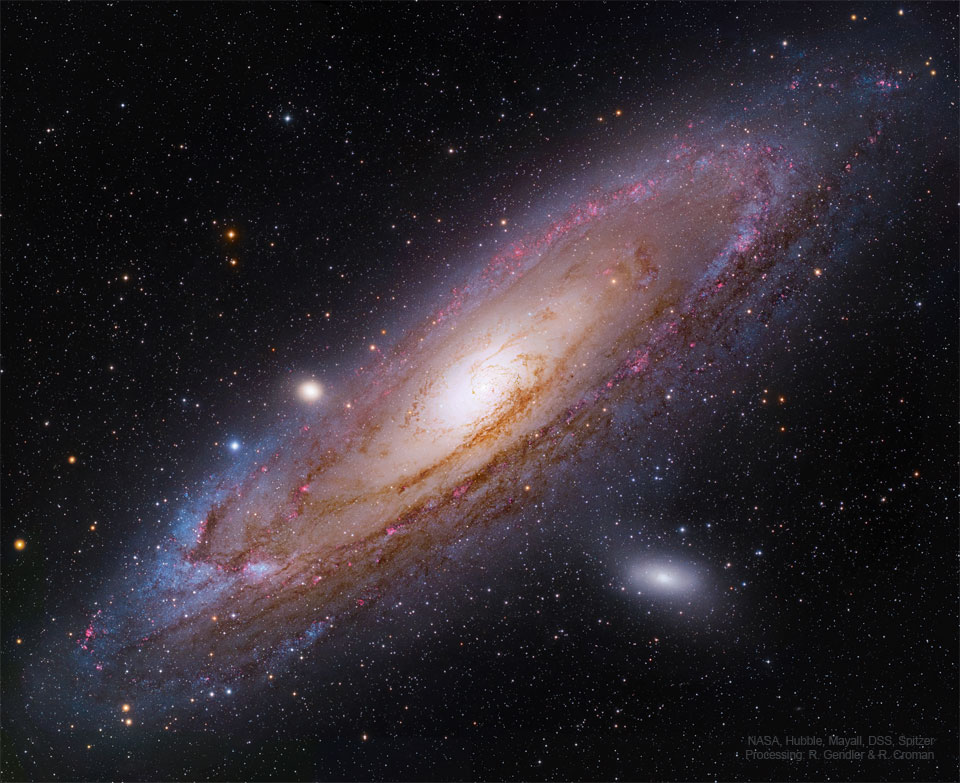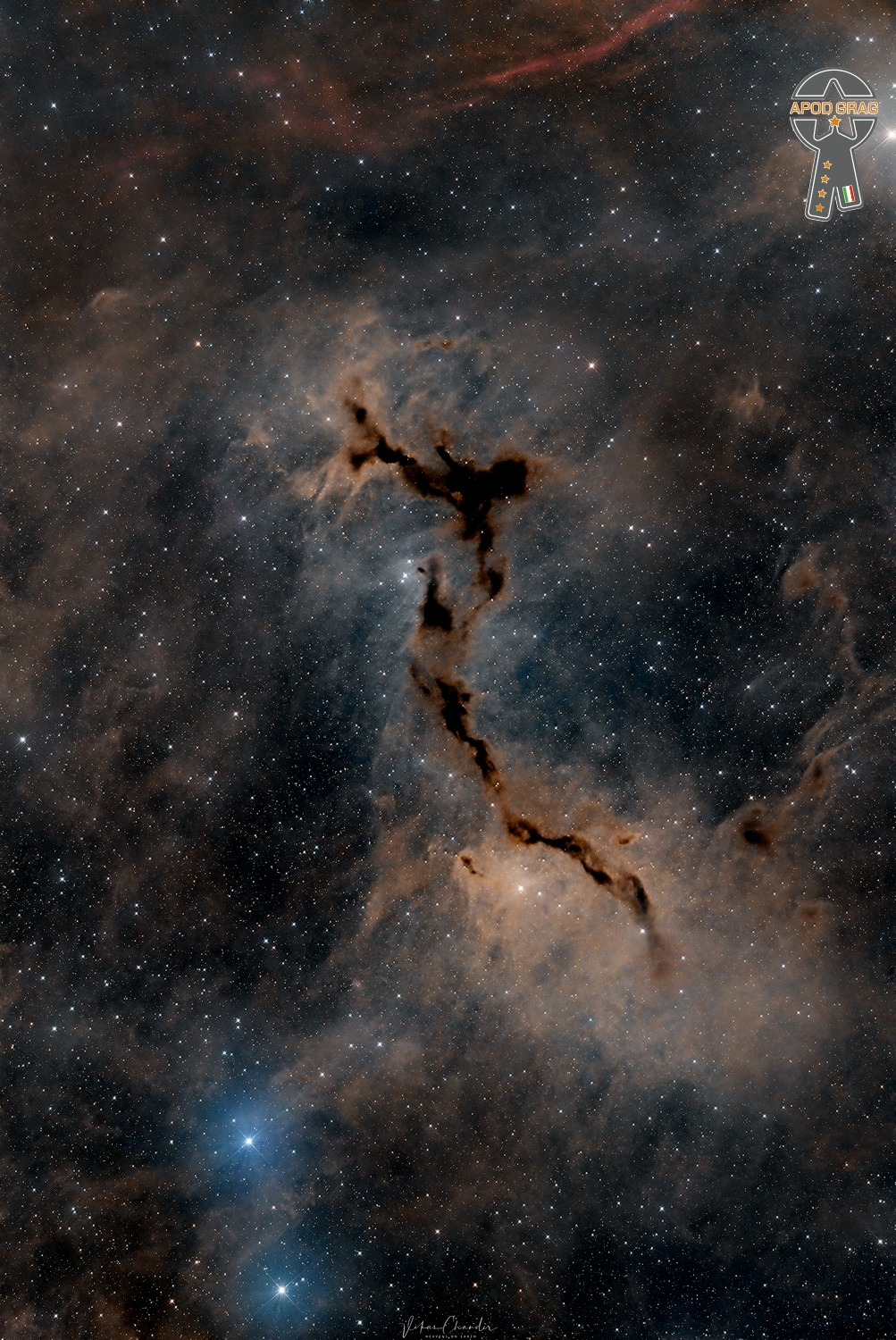Blog
Owen Joseph “Sonny” Igoe (October 8, 1923 – March 28, 2012) Jersey City, NJ
was an American jazz drummer and music educator who, toured with the orchestras of Tommy Reed (1913–2012), Les Elgart, Ina Ray Hutton, Benny Goodman, and Woody Hermanfrom the mid-1940s to the mid-1950s.
more...Park Frederick “Pepper” Adams III(October 8, 1930 – September 10, 1986)Highland, MI was an American jazz baritone saxophonist and composer.He composed 42 pieces, was the leader on eighteen albums spanning 28 years, and participated in 600 sessions as a sideman. He worked with an array of musicians, and had especially fruitful collaborations with trumpeter Donald Byrd and as a member of the Thad Jones/Mel Lewis Big Band.
more...This picture of Andromeda shows not only where stars are now, but where stars will be. The big, beautiful Andromeda Galaxy, M31, is a spiral galaxy a mere 2.5 million light-years away. Image data from space-based and ground-based observatories have been combined here to produce this intriguing composite view of Andromeda at wavelengths both inside and outside normally visible light. The visible light shows where M31’s stars are now, highlighted in white and blue hues and imaged by the Hubble, Subaru, and Mayall telescopes. The infrared light shows where M31’s future stars will soon form, highlighted in orange hues and imaged by NASA’s Spitzer Space Telescope. The infrared light tracks enormous lanes of dust, warmed by stars, sweeping along Andromeda’s spiral arms. This dust is a tracer of the galaxy’s vast interstellar gas, raw material for future star formation. Of course, the new stars will likely form over the next hundred million years or so. That’s well before Andromeda merges with our Milky Way Galaxy in about 5 billion years.

Gabriel Yared (Arabic: غبريال يارد; born 7 October 1949) is a Lebanese-French composer, best known for his work in French and American cinema.
Born in Beirut, Lebanon, Yared scored the French films Betty Blue and Camille Claudel. He later worked on English-language films, particularly those directed by Anthony Minghella. He won an Academy Award for Best Original Score and a Grammy Award for his work on The English Patient (1996) and was nominated for both The Talented Mr. Ripley (1999) and Cold Mountain (2003).
more...Mel Brown (October 7, 1939 – March 20, 2009) was an American-born blues guitarist and singer. He is best remembered for his decade long backing of Bobby Bland, although in his own right, Brown recorded over a dozen albums between 1967 and 2006.
Brown was born in Jackson, Mississippi, United States, and was presented with his first guitar as a teenager while recovering from a bout of meningitis. By 1955, after performing backing duties for both Sonny Boy Williamson II and Jimmy Beasley, Brown had a two year long stint backing Johnny Otis. This led to work with Etta James, where he swapped his Gibson Les Paul for an ES-175 to give him a richer and fuller tone to his guitar work, that set him apart from his contemporaries.
more...
Larry Young (also known as Khalid Yasin [Abdul Aziz]; October 7, 1940 – March 30, 1978) was an American jazz organist and occasional pianist. Young’s early work was strongly influenced by the soul jazz of Jimmy Smith, but he later pioneered a more experimental, modal approach to the Hammond B-3.
Born and raised in Newark, New Jersey, United States, Young attended Newark Arts High School, where he began performing with a vocal group and a jazz band.
Young played with various R&B bands in the 1950s, before gaining jazz experience with Jimmy Forrest, Lou Donaldson, Kenny Dorham, Hank Mobley and Tommy Turrentine. Recording as a leader for Prestige from 1960, Young made a number of soul jazz discs, Testifying, Young Blues and Groove Street. When Young signed with Blue Note around 1964, his music began to show the marked influence of John Coltrane.
more...onathan David Samuel Jones (October 7, 1911 – September 3, 1985) was an American jazz drummer. A band leader and pioneer in jazz percussion, Jones anchored the Count Basie Orchestra rhythm section from 1934 to 1948. He was sometimes known as Papa Jo Jones to distinguish him from younger drummer Philly Joe Jones.
Born in Chicago, Illinois, United States, Jones moved to Alabama, where he learned to play several instruments, including saxophone, piano, and drums. He worked as a drummer and tap-dancer at carnival shows until joining Walter Page‘s band, the Blue Devils in Oklahoma City in the late 1920s. He recorded with trumpeter Lloyd Hunter‘s Serenaders in 1931, and later joined pianist Count Basie‘s band in 1934. Jones, Basie, guitarist Freddie Green and bassist Walter Page were sometimes billed as an “All-American Rhythm section,” an ideal team. Jones took a brief break for two years when he was in the military, but he remained with Basie until 1948. He participated in the Jazz at the Philharmonic concert series.
He was one of the first drummers to promote the use of brushes on drums, and shifting the role of timekeeping from the bass drum to the hi-hat cymbal. Jones had a major influence on later drummers such as Buddy Rich, Kenny Clarke, Roy Haynes, Max Roach, and Louie Bellson. He also starred in several films, most notably the musical short Jammin’ the Blues (1944).
more...Prayers for Israel and Palestine today
more...Barnard 150, also known as Seahorse Nebula, is a dark molecular cloud of dust in Cepheus constellation, so thick, that it absorbs all the light that comes from the stars behind it. This molecular cloud is part of our Milky Way galaxy, one of the 182 objects cataloged by astronomer Edward E. Barnard and it lies at about 1200 Light Years away. Cloud location on the Milky Way’s plane, makes it stand out on the background completely filled with colorful stars of any age and size.
Due to all of the light emitted from these stars, the distinctive, serpent like shape of this molecular cloud can be observed. And with rotation of the image by 90 degrees, one can easily recognize why this cloud inherent a second name of “Seahorse Nebula”. This nebula is about 1 degree in size, width of two Moons. What is also interesting about this cloud, as it have 3 highly dense dust cores, which actually is a star formation regions. They were cataloged by Lynds and named LDN 1082 A, B and C, which are marked on annotated image.

more...
Millicent Dolly May Small CD (6 October 1947 – 5 May 2020) was a Jamaican singer who is best known for her 1964 hit “My Boy Lollipop“. The song reached number two in both the UK and US charts and sold over seven million copies worldwide. It was also the first major hit for Island Records and helped to achieve the label its mainstream success. She was the Caribbean’s first international recording star and its most successful female performer.
more...Tony Oladipo Allen (20 July 1940 – 30 April 2020) was a Nigerian drummer, composer, and songwriter who lived and worked in Paris, France. Allen was the drummer and musical director of Fela Kuti‘s band Africa ’70 from 1968 to 1979, and was one of the founders of the Afrobeat genre. Fela once stated that “without Tony Allen, there would be no Afrobeat”. He was described by Brian Eno as “perhaps the greatest drummer who has ever lived”.
Later in life, Allen collaborated with Damon Albarn on several projects, including Gorillaz, the Good, the Bad & the Queen and Rocket Juice & the Moon. Allen’s career and life were documented in his 2013 autobiography Tony Allen: Master Drummer of Afrobeat, co-written with Michael E. Veal, who previously wrote a comprehensive biography of Fela Kuti.
more...Samuel Blythe Price (October 6, 1908 – April 14, 1992) was an American jazz, boogie-woogie and jump blues pianist and bandleader. Price’s playing is dark, mellow, and relaxed rather than percussive, and he was a specialist at creating the appropriate mood and swing for blues and rhythm and blues recordings.
Price was born in Honey Grove, Texas, United States. Price formally studied the piano with Booker T. Washington‘s daughter, Portia Marshall Washington (1883–1978). In the mid-1920s, when he was employed in a Dallas music store, Price wrote to Paramount Records recommending Blind Lemon Jefferson to the label.
more...The Soleá is synonymous with the Soleares, known as the “Mother of Flamenco”. Flamenco guitarists usually begin their study with the Soleá since it has a relatively slow BPM (usually 50-110BPM). As a result, students have ample time to feel comfortable with the compás accents.
The compás for the Soleá is as follows:
123 456 78 910 1112 or 123 123 12 12 12
Soleá CompásHarmonic tension between the E major and F major chords is prevalent in the Soleá form, causing both harmonic and tension and resolve throughout a performance. A Soleá may include the escobilla section, where the beat shifts to a feeling of three
more...IC 5146 (also Caldwell 19, Sh 2-125, Barnard 168, and the Cocoon Nebula) is a reflection/emissionnebula and Caldwell object in the constellation Cygnus. The NGC description refers to IC 5146 as a cluster of 9.5 mag stars involved in a bright and dark nebula. The cluster is also known as Collinder 470. It shines at magnitude +10.0/+9.3/+7.2. Its celestial coordinates are RA 21h 53.5m , dec +47° 16′. It is located near the naked-eye star Pi Cygni, the open cluster NGC 7209 in Lacerta, and the bright open cluster M39.The cluster is about 4,000 ly away, and the central star that lights it formed about 100,000 years ago; the nebula is about 12 arcmins across, which is equivalent to a span of 15 light years.
When viewing IC 5146, dark nebula Barnard 168 (B168) is an inseparable part of the experience, forming a dark lane that surrounds the cluster and projects westward forming the appearance of a trail behind the Cocoon.

Sandra “Puma” Jones (October 5, 1953—January 28, 1990) was an American singer, best known as a member of the Grammy Award-winning reggae group Black Uhuru.
Born in Columbia, South Carolina, Jones graduated from Columbia University in New York City with a master’s degree and served as a social worker. She studied dance with the Chuck Davis troupe where she took a particular interest in African dance. After becoming disillusioned with city life she declared a need to “discover her roots” and moved to Jamaica.
Deciding to build a singing career, Jones briefly sang with Miriam Makeba (then using the name Mama Africa), and sang with the band Sons of Negus led by Ras Michael. In 1978, she was introduced by a mutual friend to Derrick “Duckie” Simpson, the leader of reggae group Black Uhuru. That group was undergoing a significant lineup change that also included the addition of singer Michael Rose. Jones became a full member of Black Uhuru and sang on seven studio albums, starting with Showcase in 1979 and also including the critically acclaimed Red in 1981 and the Grammy Award-winning Anthem in 1983. That album won the award for Best Reggae Album in 1985, the first year of that award’s existence.
Jones was noted for adding lyrics on religious and social topics to Black Uhuru songs, during a period when reggae musicians were often accused of being trite and dismissive of women, and she was also known for her haunting voice. Her last full album with the group was Brutal in 1986, which was nominated for another Grammy Award and reached the charts in New Zealand and the Netherlands. Before sessions began for the album Positive in 1987, Jones was diagnosed with breast cancer. She had to withdraw from Black Uhuru and was replaced by singer Olafunke. Jones returned to the United States for treatment and died at age 36 on January 28, 1990. She was buried near her family home in South Carolina.
more...Steven Haworth Miller (born October 5, 1943) is an American musician. He is the founder and only remaining original member of the Steve Miller Band, which he founded in 1966, and is the principal songwriter, lead singer, harmonicist, keyboardist, and one of the guitarists. He began his career in blues and blues rock and evolved to a more pop-oriented arena rock genre during the mid-1970s through the early 1980s, releasing popular singles and albums. Miller was inducted into the Rock and Roll Hall of Fame in 2016.
Born in Milwaukee, Miller received his first exposure to music from his mother, Bertha, whom he described as a remarkable jazz-influenced singer, and his father, George, a physician known as “Sonny” who, in addition to his profession as a pathologist, was a jazz enthusiast and an accomplished amateur recording engineer. Guitar virtuoso Les Paul and his musical partner Mary Ford were regular visitors at the Miller house. The Millers were the best man and the matron of honor at the December 1949 Paul/Ford wedding. Paul became Steve’s godfather. Les Paul heard Steve, who was six, on a wire recording made by Dr. Miller, “banging away” on a guitar given to him by his uncle, Dr. K. Dale Atterbury. Paul encouraged Miller to continue with his interest in the guitar… and “perhaps he will be something one day.”
more...More Posts
- The Cosmos with Arp 299
- Joey Defrancesco Day
- Omar Sosa Day
- Bunny Wailer Day
- Kishori Amonkar Day
- Roscoe Gordon Day
- Flamenco Fridays with José de la Tomasa y Manolo Franco
- Daily Roots with African Child & the Prophet Unification
- Music for Surviving the Pandemic
- The Cosmos with 2XMM J143450.5+033843
- Steve Gadd Day
- Reuben Wilson Day
- Carl Perkins Day
- Mance Lipscomb Day
- World Music with Al Bilali Soudan
- Daily Roots with Sly & Robbie
- Music for Surviving the Pandemic
- The Cosmos with IC 342
- Julian Lennon Day
- Santiago Jimenez Jr. Dia